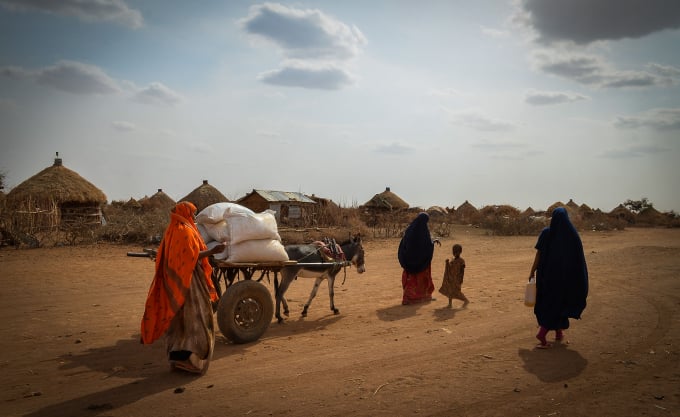June 19, 2025 | 01:28 GMT +7
June 19, 2025 | 01:28 GMT +7
Hotline: 0913.378.918
June 19, 2025 | 01:28 GMT +7
Hotline: 0913.378.918

Better data on rural poverty can play a crucial role in shaping more accurate policies. Photo: FAO/IFAD/WFP/Michael Tewelde
The majority of the world’s poor live in rural areas, but reliable and harmonised information on their numbers and conditions is difficult to come by.
To help meet this deficiency in the fight against global hunger, the Food and Agriculture Organization of the United Nations (FAO) has published a report in collaboration with the Oxford Poverty and Human Development Initiative (OPHI), which introduces an innovative Rural Multidimensional Poverty Index (R-MPI).
The R-MPI broadens existing methods for measuring rural poverty by taking a closer look at rural people’s capabilities: food security, the quality of their nutrition; their education, and living standards. Moreover, FAO and OPHI added two key aspects affecting the life of rural dwellers in particular: access (or the lack thereof) to adequate agricultural assets and exposure to environmental and other risks and social protection.
“Despite the fact that a range of poverty measures already exist and are commonly used, harmonised information on rural poverty, which could inform a sound and homogeneous measurement, is less readily available. The R-MPI includes innovative indicators on the adequacy of agricultural assets ownership, rural social protection and risk exposure. In the application proposed in the report, the R-MPI makes use of innovations in the risk dimension, combining household survey with geospatial data,” FAO Chief Economist Maximo Torero Cullen said at the report’s launch.
The R-MPI builds on the notion that a single dimension, such as household income, does not accurately capture poverty in rural areas. It is now widely recognised that hardship means much more than an empty bank account.
That notion is reflected in the Global Multidimensional Poverty Index (MPI), which was launched in 2010 by the United Nations Development Programme and OPHI and covered 109 countries and 5.9 billion people in 2021.
The R-MPI, which expands the scope of the global MPI, also includes an innovative combination of geospatial and survey data that quantifies rural dwellers’ risks of exposure to drought, floods or heat waves.
“The launch of this innovative Rural MPI is an important first step to shape the data environment and the discussion on how to continue to advance the understanding of rural poverty with the objective of ending it in all its forms and dimensions,” said Sabina Alkire, Director of OPHI.
Useful findings
The usefulness of this new tool is illustrated in the joint FAO-OPHI report, which tested the index using recent household surveys in Ethiopia, Malawi, the Niger and Nigeria.
The report shows how the R-MPI captures additional and different information compared to other measures – both monetary measures and multidimensional measures – that do not include rural specificities. The dimensions included were proven to be efficient from a statistical standpoint. The overlap between monetary and non-monetary deprivations is significant. However, the R-MPI captures more. In Malawi, for instance, as much as 14 percent of the rural poor identified by the R-MPI were not identified as poor by the monetary metric.
The R-MPI was also tested in the field, specifically in 64 rural areas of Malawi. Community members were asked to review the dimensions included in the R-MPI, based on their life experience, and define, in their own words, rural hardship and poverty. While most dimensions turned out to be considered crucial, others – such as state of mind or physical appearance – also surfaced. While not all of these can easily be elicited in large-scale surveys, important lessons were learned about the limitation of money metrics and the importance of tailoring the measurement to rural contexts.
All this is not just about producing more data. A more precise identification of who the extreme poor are, where they live, and what specific constraints prevent them from escaping poverty in rural areas, can play a crucial role in shaping more accurate policies to tackle rural poverty and hunger.
FAO is supporting countries in designing and enacting policies that address the condition of poor and small-scale farmers, enhancing their livelihoods and improving their resilience and ability to escape extreme poverty. The R-MPI can help as a guiding tool for policy makers, and as a monitoring tool for projects and programs that seek to tackle rural poverty.
(FAO.org)

(VAN) Extensive licensing requirements raise concerns about intellectual property theft.

(VAN) As of Friday, a salmonella outbreak linked to a California egg producer had sickened at least 79 people. Of the infected people, 21 hospitalizations were reported, U.S. health officials said.

(VAN) With the war ongoing, many Ukrainian farmers and rural farming families face limited access to their land due to mines and lack the financial resources to purchase needed agricultural inputs.

(VAN) Vikas Rambal has quietly built a $5 billion business empire in manufacturing, property and solar, and catapulted onto the Rich List.

(VAN) Available cropland now at less than five percent, according to latest geospatial assessment from FAO and UNOSAT.

(VAN) Alt Carbon has raised $12 million in a seed round as it plans to scale its carbon dioxide removal work in the South Asian nation.

(VAN) Attempts to bring down the price of the Japanese staple have had little effect amid a cost-of-living crisis.